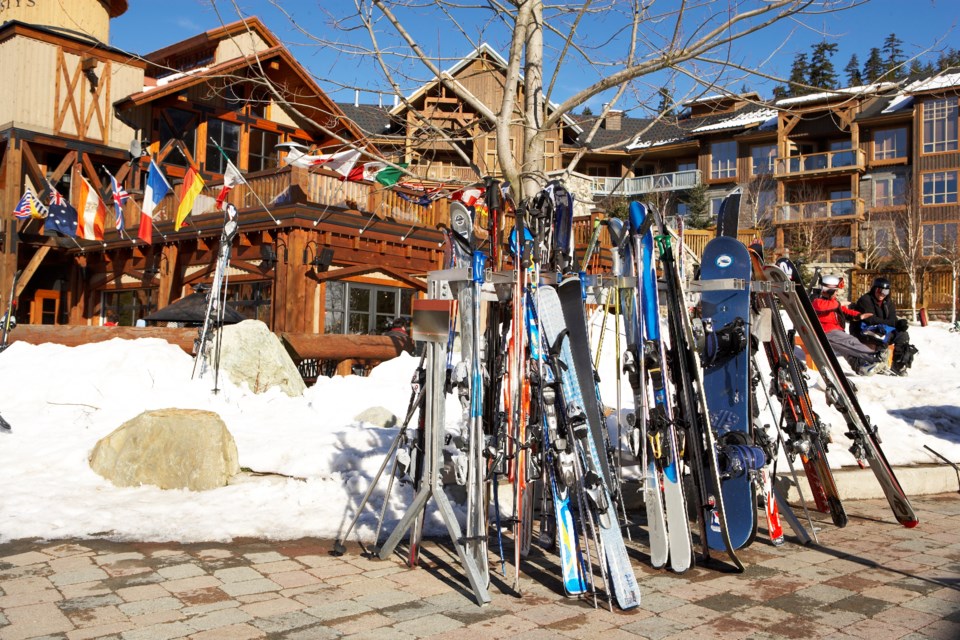As COVID-19 cases continue to rise both locally and provincially, new health restrictions announced by Victoria just days before Christmas have dealt another blow to Whistler businesses banking on a busy holiday period.
“The announcement [Tuesday, Dec. 20] will impact a group of businesses that have only just recently seen a return of operations in the fall. This will be another knock to their recovery and another financial hit,” said Diana Chan*, board chair of the Whistler Chamber of Commerce, in an email.
Coming into effect at 11:59 p.m. on Dec. 22 and lasting until Jan. 18, the new orders prohibit indoor organized gatherings such as weddings and receptions. Additionally, bars, nightclubs, fitness centres, and dance studios will be closed.
Seated events will be reduced to 50 per cent of their capacity regardless of their venue size, which marks a departure from a Dec. 17 announcement that only venues for over 1,000 people would see their capacity limited.
Restaurants, pubs, and cafés are permitted to stay open but only a maximum of six guests may be seated per table (plus physical distancing or barriers). Guests cannot mingle between tables.
For a restaurant sector that has bore the brunt of the public-facing health orders through much of the pandemic, the timing of the new orders has left restaurants reeling.
“[W]e kind of had an idea the next move would be to take some capacity away for restaurants, which is really tough on us, obviously,” said Eric Griffith, chair of the Restaurant Association of Whistler. “All of the businesses have been prepping, ordering and staffing like they’re ready to go for a full-on Christmas.”
While restaurants are adept by this point at managing reduced capacities, the most significant challenge for the sector is the loss of revenue at a historically busy time of year.
However, Griffith was thankful restaurants are allowed to maintain their previous operating hours, which he’s hopeful will help them spread out reservations. New Year’s Eve is another story, as Griffith said most restaurants were already booked to capacity prior to this week’s announcement.
“Say you have 100 tickets sold and now you can only seat 70 or 80 people. Where do those 30 people go? We’ve got their payments already. That means money going back and fees on the credit card side and all those things start to add up,” he said.
While nowhere near pre-pandemic levels, Tourism Whistler president Barrett Fisher said bookings for Whistler’s holiday period were looking strong when compared to last year. Unsurprisingly, the international market continues to lag, but the regional and domestic market continues to show strong demand for the resort.
“I think even before we get into the recent travel advisories, we knew that our international markets would be soft,” Fisher said. “But we were certainly seeing some strong demand from our B.C. and domestic market. So the winter season is actually faring to look very strong because there is pent-up demand and because some of the uncertainty around the pandemic, many people continue to stay closer to home.”
Mounting concern over the Omicron variant is leading to some hesitancy and last-minute cancellations, primarily from international guests, Fisher noted, although she added the cancellations haven’t been significant up to this point.
Saad Hasan of the Hotel Association of Whistler posited that the communication around the variant has caused some confusion among prospective international guests worried about new regulations.
“We are constantly having to look at the forest for the trees in the sense that we have to explain and clarify for our guests that things haven’t changed as much from a regulatory perspective,” he said.
Vancouver Coastal Health confirmed to Pique that cases are “increasing in our region across many communities and many of these cases are the Omicron variant of concern.” The email went on to say that transmission continues to happen most often in households and in social networks, “particularly at unstructured indoor events such as private parties and gatherings.” The spokesperson also noted that while Omicron is more transmissible than other variants, to date there is no evidence it causes more severe illness.
Find out about vaccinations in the VCH region at vch.ca/covid-19/covid-19-vaccine.
The Chamber continues to advocate for a ramping up of rapid testing, and is working with B.C.’s chamber network to provide cost-effective access to rapid tests for Whistler businesses.
In her email, Chan reiterated the need to consider the well-being of Whistler’s employees and business owners.
“It is important to recognize the mental toll this will have on our business owners, operators and the teams working in these businesses. Many employees will be required to enforce these new restrictions, and that can have a substantial impact on their mental health,” she said.
-With files from Elana Shepert / Vancouver is Awesome.
*An earlier version of this story misspelled Diana Chan's last name.



